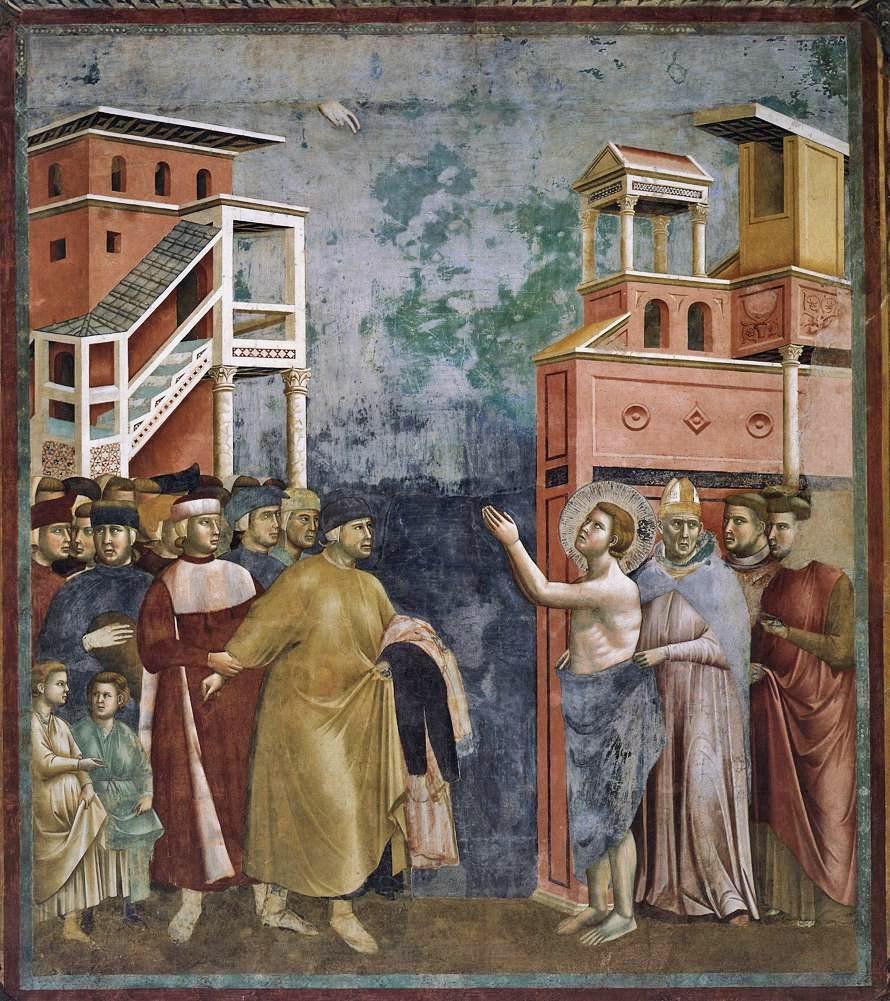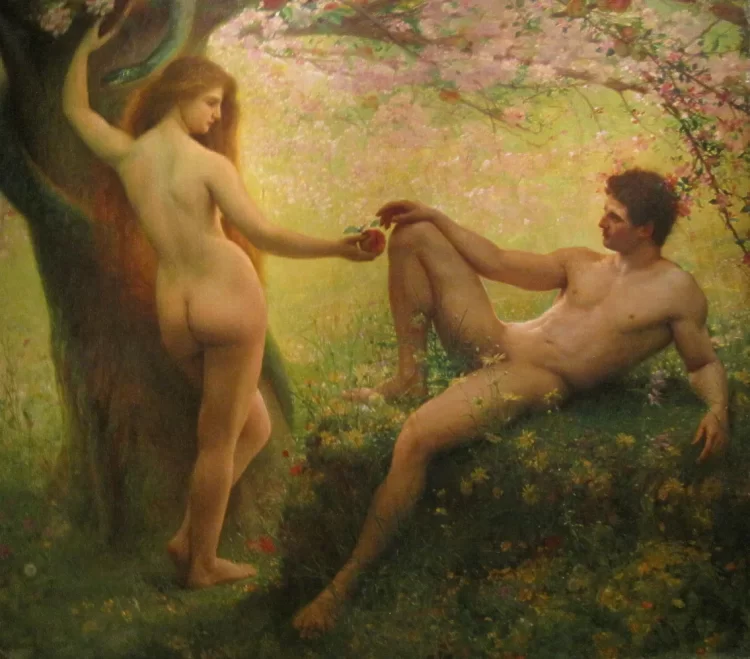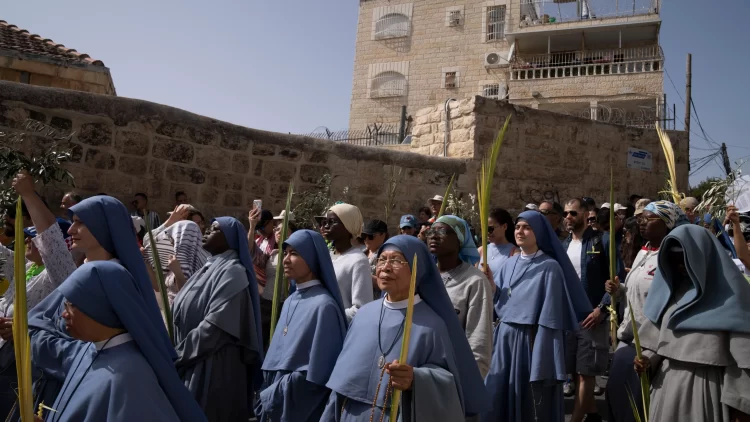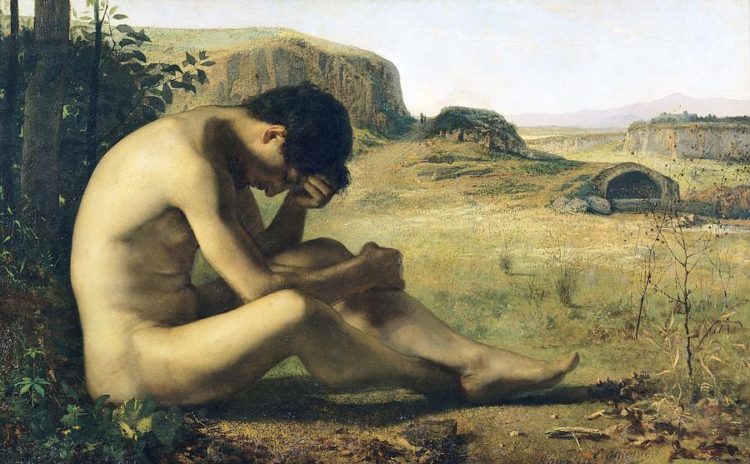October 4 is the feast day of St. Francis of Assisi (1182–1226), one of the most winsome saints in the Christian calendar. Many churches have a blessing of animal in remembrance of Francis’ loving relationship with the natural world, as expressed in his Canticle of the Sun. Statues of St. Francis usually portray him with some of the birds and beasts he reportedly talked to.

Francis of Assisi has become identified with the environmental movement. His namesake, Pope Francis, named his 2015 encyclical on the Environment “LAUDATO SI’, mi’ Signore” – “Praise be to you, my Lord”, the opening words of Francis’ Canticle of the Sun. The pope writes: “In the words of this beautiful canticle, Saint Francis of Assisi reminds us that our common home is like a sister with whom we share our life and a beautiful mother who opens her arms to embrace us.” “Praise be to you, my Lord, through our Sister, Mother Earth, who sustains and governs us, and who produces various fruit with colored flowers and herbs”.
Centuries before Gaia theory, Francis of Assisi sensed the need for an identification with the natural world if we were to properly care for it. He felt related brother sun and sister moon, mother earth. rushing wind and flowing water “pure and clear,” and the inhabitants of the earth, including brother wolf, as well as gentle death who leads home the child of God.
Walking barefoot, Francis was connected directly to the body of the earth. There’s an electrical charge that flows from the earth into our bodies if our bodies touch the ground directly. This is called “earthing.” That’s why it is energizing to walk barefoot through the grass or along a forest path or on the beach. Our bodies need to connect with earth’s body. We need to breathe the air into our lungs, feel the breeze on our skin, sense earth under our feet, smell the foliage around us which tickles our nostrils, hear the chirping of the birds and the rustle of the small mammals in the leaves that sends little vibrations into our ears.

Just as Francis wanted to identify with the natural world, so he wanted to identify with the poor and sick. He founded what became the Franciscan Order of little brothers, whose work was done in the world among the poor and sick rather than in a monastery. His female follower, Clare, founded a sister order of the Poor Clares.
But Francis could not identify with the poor as the son of wealth. His ministry began by shedding the trappings of wealth that he received from his rich merchant father by taking off all his fine clothes and laying them at his father’s feet. Shocked, the Bishop of Assisi tried to cover Francis’ naked body with his cloak (as in the painting above from the Franciscan church in Orvieto). Below is the scene of Francis stripping off his clothes and giving them back to his father from the 1972 film Brother Sun, Sister Moon (Italian: Fratello Sole, Sorella Luna) directed by Franco Zeffirelli and starring Graham Faulkner as Francis
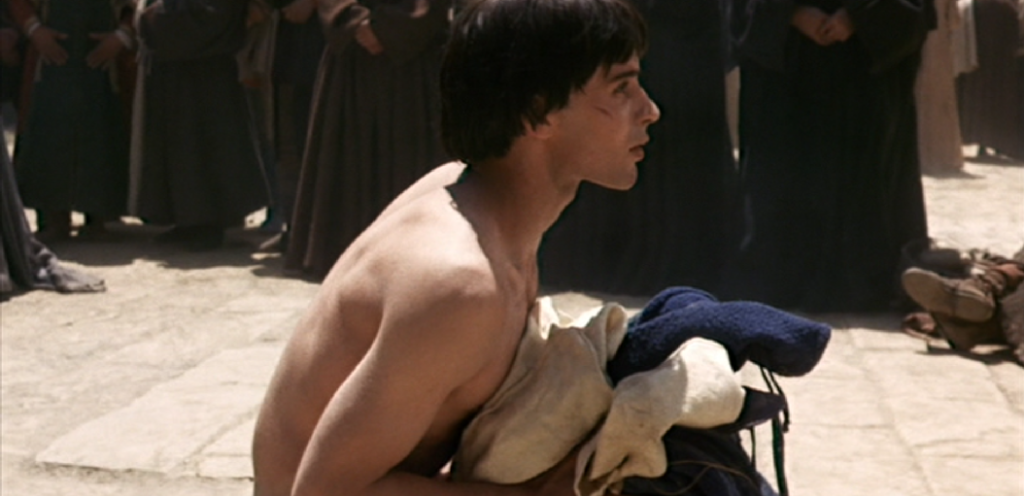
This incident sparks the theme of this article. I will focus on the Franciscan motto, “naked to follow the naked Christ,” and its implications for us and for our society. The article is based on a sermon I preached at St. Augustine’s Episcopal Church, Wilmette, IL on October 20, 2021. The readings for that Sunday were those appointed for Pentecost 20, Year B in the Revised Common Lectionary. The readings were (in reverse order) Mark 10:17—31; Hebrews 4:12-16; Job 23:1—9, 16—17. That sermon is slightly expanded here into an article about shedding possessions. It begins with a review of the Gospel for that day.
The Sermon
As Jesus was setting out on his journey, a man came up to him and asked what he must do to inherit eternal life. This story is told pretty similarly in all three synoptic gospels. But while Mark just calls him “a man,” although presumably a rich man since he had many possessions, Matthew makes him “a young man,” and Luke calls him “a ruler.” That’s how he came to be known as “the rich young ruler.” We aren’t comfortable with inconsistencies in the Biblical texts. For today he’s just a wealthy man.
However he might be characterized, there’s no doubt that he was sincere in asking his question because he kneels before Jesus and calls him a “good teacher.” Jesus, remember, is trying to get going on his journey, and he replied a bit testily (“Why do you call me ‘good?’ Only God is good.”) and simply threw the Commandments at him, which are randomly recited from the second table of the Law – the commandments concerning our relationship neighbor. The man responds that he has kept all these commandments since his youth.
Taken by the man’s sincerity, Jesus looked at him lovingly and said, “Okay, there’s one thing missing. Go, sell what you have, and give the money to the poor, and you will have treasure in heaven; then come, follow me.” When the man heard this, our text says, “he was shocked and went away grieving, because he had many possessions.”
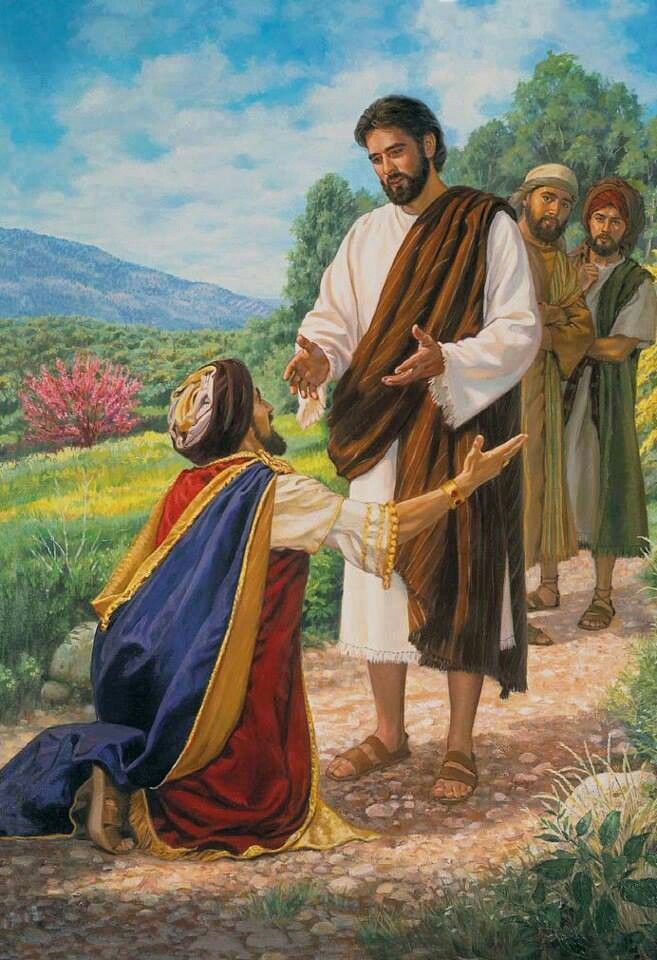
There are several issues here worth pondering. The man was obviously attracted to Jesus and he was sincere in his question. He was obviously a practitioner of his religious upbringing. Why was he not satisfied with that upbringing? He could have simply accepted Jesus’ answer as an affirmation of his devotion. He could have simply said, “Okay, that’s what I’ve been doing. I’ll keep on doing it.”
But his evident disappointment communicated to Jesus that he felt that this was inadequate. That encouraged Jesus to say something more. But the something more Jesus told him was something he could not do. The fact that he walked away sad was also sad for Jesus.
How many of us could have done what Jesus asked of the rich man? Most of us also have many possessions which we find it difficult to give up. We discover that when we move. We may have retained objects shoved into closets and basements from several previous moves. We justified it by saying that we might need it sometime. I’ll confess that it took Mary and me a year to clean out our old stuff that we couldn’t take with us into our condo – a whole year! And on the day the moving van was being loaded, I was still making trips out to the dumpster.

We’re all hoarders. We acquire things and hold on to them for security. Look at how shelves in stores were depleted at the onset of the coronavirus pandemic. We’re reluctant to throw away stuff that represent our life’s journey, and we don’t want to part with our old life to embrace our new life. I think that was the issue here with the man who approached Jesus. He couldn’t make a break with his past life to join Jesus on his pilgrimage into the kingdom of God.
One who could and did make a break with his past life, in most dramatic ways, was St. Francis of Assisi. His break with his family of origin was so complete that he took off all the clothes he was wearing and, in the public square and in front of the bishop of Assisi, handed them back to his rich merchant father. (See the image above this post from the basilica at Orvieto painted by Giotto.) His action was so compelling that he won the sympathy of the people of Assisi, who had previously sided with Francis’ father against his rebellious son, and within a few years thousands of men had become Franciscans, along with all wcomen who constituted the poor Claires. Following the statement of the ancient church father, St. Jerome, Francis would be “naked to follow the naked Christ.” (Jerome himself often went out into the Judean desert to pray and meditate naked.)
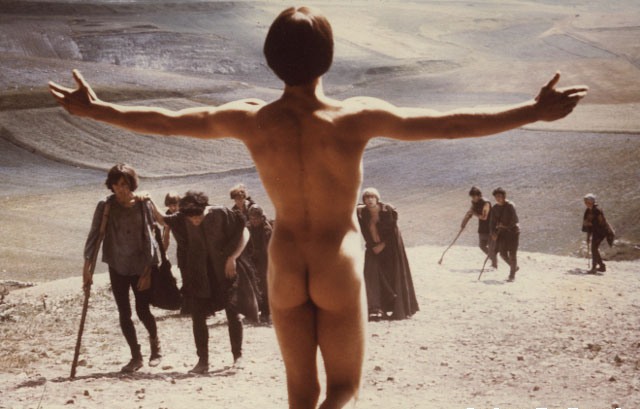
When Francis wanted to provide a Rule for his growing community, he had a priest open the Book of the Gospels and read whatever passage he opened to. What he opened to and read was exactly what we just heard today from Mark 10:21: “Go, sell what you own and give the money to the poor, and you will have treasure in heaven; then come, follow me.”
Well, said Francis, that’s the word God gave us. That’s the first item in our Rule. And thousands of would-be Franciscans did exactly that. Even Francis, who had exchanged the fine clothing of his father the cloth merchant for a beggar’s robe had kept a leather belt. He later exchanged that for a rope.
During the late Middle Ages, many Franciscans emulated their founder by processing naked through towns as a sign of repentance. As our second reading from Hebrews tells us, “God’s word is penetrating and pierces the soul. Before God no creature is hidden, but all are naked and laid bare to the eyes of the one to whom we must render an account.” Being naked before God reminds us through our bodily experience that God sees us as we are.
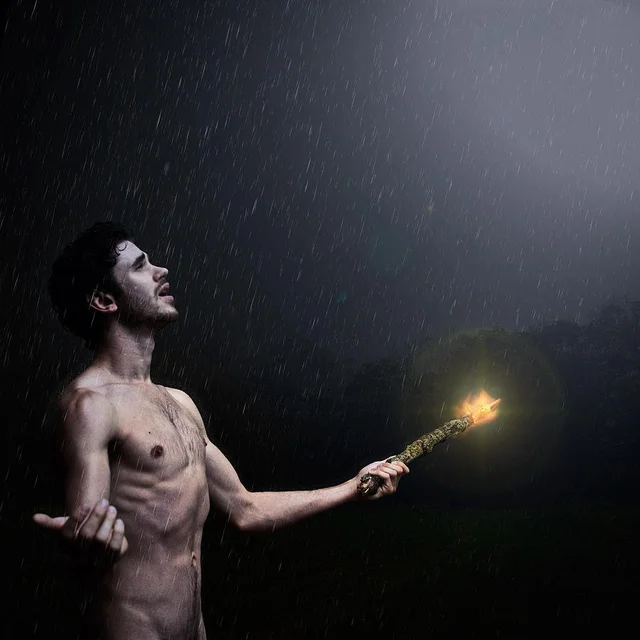
Being naked before God also reminds us that if we would follow Christ we cannot cling to our possessions, not even our clothes. Most of us hold onto our clothes long past their durability or suitability for our wear. Why? Because we identity with our possessions, sometimes too much. We must learn to identify with Christ and be defined by our discipleship. “Naked to follow the naked Christ.”
The Franciscans emphasized the nakedness of Christ in his birth (wrapped in swaddling cloths) and in his death on the cross (hanging naked for all to see). We come into the world naked and we leave the world naked. Preachers in the time after Francis accentuated the nakedness of Christ in his crucifixion. John of Ruysbroeck (1293–1381) proclaimed, “[Christ] was stripped stark naked. So fair a body neither man nor woman ever saw so cruelly ill-used. He suffered shame, and anguish and cold, before all the world: for he was naked, and it was cold, and a searching wind cut into His wounds.” There was a tendency in religious art in the late Middle Ages and into the Renaissance to expose as much of Christ’s crucified body as modesty for viewers allowed. In art and film in the late 20th century, historical realism portrayed a fully exposed naked Christ (Christus nudum), such as Martin Scorsese’s film, The Last Temptation of Christ, starring Willem Defoe as Christ.
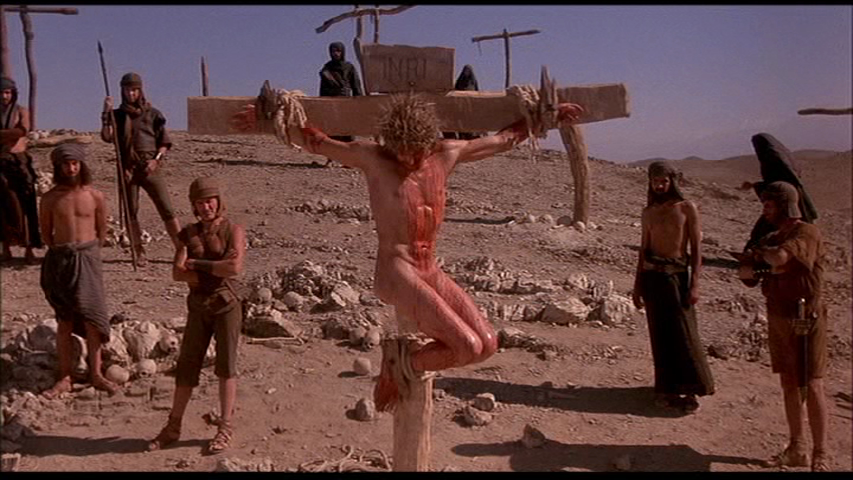
The Franciscans emulated Christ in his passion by joining in penitential processions, stripped and whipping themselves. These processions were not to atone for the sins of the penitents, which Christ accomplished on the cross, but to share in the sufferings of Christ because of an unrepentant church. This kind of penitential procession is still performed in some Catholic countries, such as the Philippines where the penitents process through the streets whipping themselves on Good Friday. Church authorities don’t endorse these penitential processions today any more than they encouraged them in the Middle Ages. But devotion to the suffering Christ demanded them. Francis himself developed the stigmata (marks of the nails in his hands and feet) at the end of his life.

Most of us aren’t going to become Franciscans. We’re not going to literally get naked and process through the streets as penitents and we’re to going to give away all our possessions. And even for Franciscans it has been a problem not to accumulate wealth, at least for their community. It is really hard to give things away and make a new start. Jesus himself said so: “How hard it will be for people who have wealth to enter the kingdom of God.” His disciples were perplexed by this, and Jesus reiterated it. “Children, how hard it is to enter the kingdom of God! It is easier for a camel to go through the eye of a needle than for someone who is rich to enter the kingdom of God.”
It’s been claimed that “the eye of a needle” Jesus was referring to, was a small gate within the big city gate that would require the camels to be unloaded of their goods (for customs, I suppose) than to get through with their freight. You’ve got to shed your stuff to get into the kingdom of God.
Jesus’ disciples were astounded and asked him, “Who then can be saved?” Jesus responded, “For humans it is impossible, but not for God; for God all things are possible.”
Here’s the good news. We don’t have to do something to save ourselves because we can’t. It’s impossible. Think of the man who came to Jesus asking what he had to do to inherit eternal life. Why was he asking what he needed to do to claim his inheritance? An inheritance is a gift of grace that is given to us, not something to be earned, even by doing all the commandments. We always think we are justified by our good works. But we are justified by faith through grace.
Let me bring in here our reading today from Job. You’ve got to put this passage into the context of the whole story. Job has suffered a lot. His friends, who are conventional thinkers, think it’s because of something Job did or failed to do, and he should repent. We, the readers, know that Job’s suffering was not because of his unrighteousness. He was suffering because God allowed Satan, God’s prosecutor, to test Job’s faith. But Job is so sure of his righteousness that he’s willing to argue his case before God in heaven. He will justify himself on the basis of his righteousness and be acquitted. But as Isaiah said, “All our righteousness is like a filthy rag.” No, Job will finally by justified by his unwavering faith in God. The prosecutor will not have proven his case, and all the things Job lost will be more than restored.
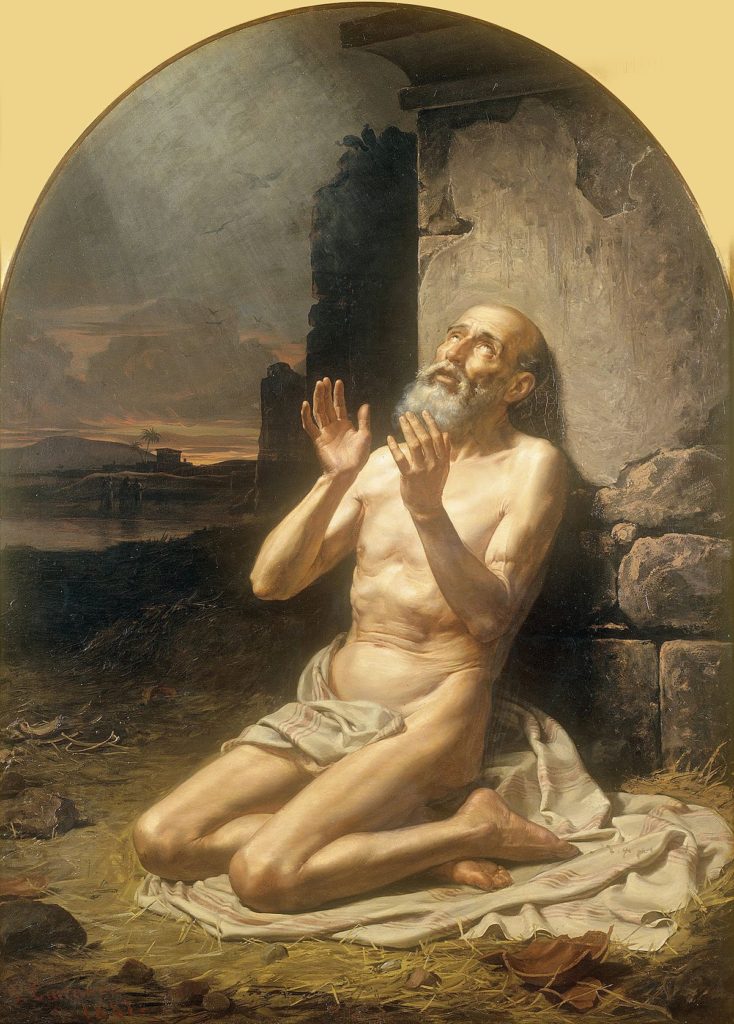
So also Peter, always the one to state what was on everyone’s mind, points out that Jesus’ disciples have left everything to follow him: their work and property (and therefore their income), their families and friends. Jesus acknowledges this and says that they will receive riches and family a hundredfold in the kingdom, and eternal life in the age to come, although not without persecutions first in which their faith will be tested. But entrance into the kingdom of God is still a gift of grace.
Those who have embarked on the journey into the kingdom of God will verify that what they have received and what lays ahead is greater than what they left behind. We may continue to love our home of origin. A couple of weeks ago my siblings and I all got together after more than two years and rehearsed our memories. Interestingly our memories about home differed. But we can’t go home again because a new home awaits us. And we have found waystations on our journey to that eternal home that we have also loved and supported – the parish churches, for example, in which we have enjoyed worship and fellowship. But we must journey on through the stages of life in this world, “until…the busy world is hushed, the fever of life is over, and our work is done.” Then we pray the Lord in his mercy to “grant us a safe lodging, and a holy rest, and peace at the last.”
The historical story of the Franciscans is a reminder that we continue to accumulate. The Franciscans gave away their silks and satins but kept their broadcloth and sackcloth. They sold their manor houses but kept their huts. They stopped eating beef and pork but ate bread and fish. So even resolving to give away possessions has its limitations. We can’t give away everything no matter how hard we try. Yet the radical call to follow Jesus must still and always be heard so we don’t get bogged down in what we accumulate along life’s way. But we must also hear Jesus’ word that what is impossible for us is possible for God. We are justified by faith through grace. We don’t need to earn what God has promised us. We just need to get rid of what weighs us down now so that we can take possession of our eternal home. Amen.
Pastor Frank C. Senn, STS


